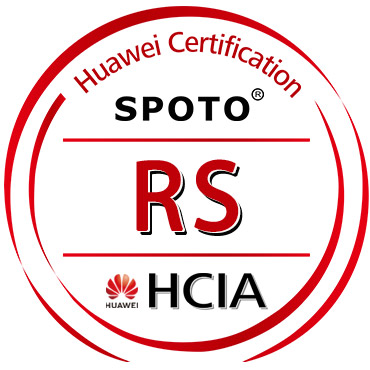Let’s compare the two of the associate level certification that is offered by both of the certification providers.
• Huawei Certified ICT Associate (HCIA)
Huawei Certified Network Associate which is shortly known as HCIA certification which would validate the skills and knowledge which would be required for basic maintenance and configuration of small to medium-sized networks. It would be covering the basic TCP/IP technologies, IP network connectivity, Ethernet technologies like the STP and RSTP, VLAN and Link Aggregation as well as their implementation within Huawei switches. Routing principles and technologies are going to be included RIP and OSPF for IPv4 and IPv6 networks, WAN technologies, network management, IP based security, as well as IPv4 and IPv6 based application services.
With HCIA certification, you are going to demonstrate a basic understanding of small and medium-sized networks, which would include the general network technologies, and the ability to assist the design of small and medium-sized networks, and going to implement the designs using Huawei routing and switching devices.
With engineers who are going to have the HCIA certified, enterprises are able to construct simple networks as well as integrate voice, wireless, security, cloud, and storage technologies into their networks in order to support a diversity of applications.
On completion of this program, the participants would be able to have the:
• Knowledge about the process of Ethernet and relevant technology
• Knowledge about how to select the right network facilities of Huawei.
• Understanding the principles, functions and relevant knowledge of common network protocols.
• Understanding how routers, switches, and firewalls work.
• Mastering the knowledge of IP address, Mask and Subnet address planning
• Mastering the basic configuration of VLAN, STP, VRRP, Static Route, RIP Routing Protocol, OSPF Routing Protocol, PPP, and FR.
• Mastering the common methods of network maintenance and troubleshooting.
• Become a primary technician of ICT who has a good command over planning, configuring, managing and maintaining medium and small-sized enterprise network.
• Cisco Certified Network Associate (CCNA)
Cisco CCNA Certification is going to be demonstrating as competence as a Network Professional. Cisco Certified Network Associate or the CCNA certification is going to be validating your ability to installing, configuring, operating and troubleshoot routed & switched networks. CCNA certified professionals could make connections in order to remote sites via a wide area network (WAN), mitigating the basic network security threats, and understanding the fundamental networking terminology and concepts.
CCNA certification is considered to be Cisco’s most popular certification, and one of the tech industry’s most sought-after career credentials. Becoming CCNA certified is going to be quite a distinctive the first step toward a rewarding career as a network engineer or administrator. There are numerous Cisco training programs and specialized college degrees that would be featuring coursework in Cisco networking.
Skills which you could gain by CCNA Certification:
Key knowledge areas and skill which would are covered by the Cisco CCNA certification exam are going to include the following.
Cisco Certified Network Associates would enable to:
• Understanding how the different network topologies interact to form a secure IT network
• Explaining how a computer network works and how it interacts with networked devices
• Configuring, verifying and troubleshooting a switch with VLAN & interswitch communications
• Implementing an IP addressing scheme and IP Services to meet specific network requirements
• Configuring, verifying and troubleshooting routing and router operations on current Cisco devices
• Identifying network security threats and describe threat mitigation methods & countermeasures
• Describing and performing the appropriate tasks for the wireless local area network (WLAN) administration
• Setup and verifying WAN links and execute the proper methods for connecting to a wide area network
• Implementing & supporting Network Address Translation (NAT) and Access Control Lists (ACLs) in branch office networks
So basically both of the certifications hold their equal importance and earning these certifications, wouldn’t going to an easy task to gain it. So, if you have a desire to gain it, you could have it by gaining proper training, like that offered by the SPOTO.

 Join Telegram Study Group ▷
Join Telegram Study Group ▷














